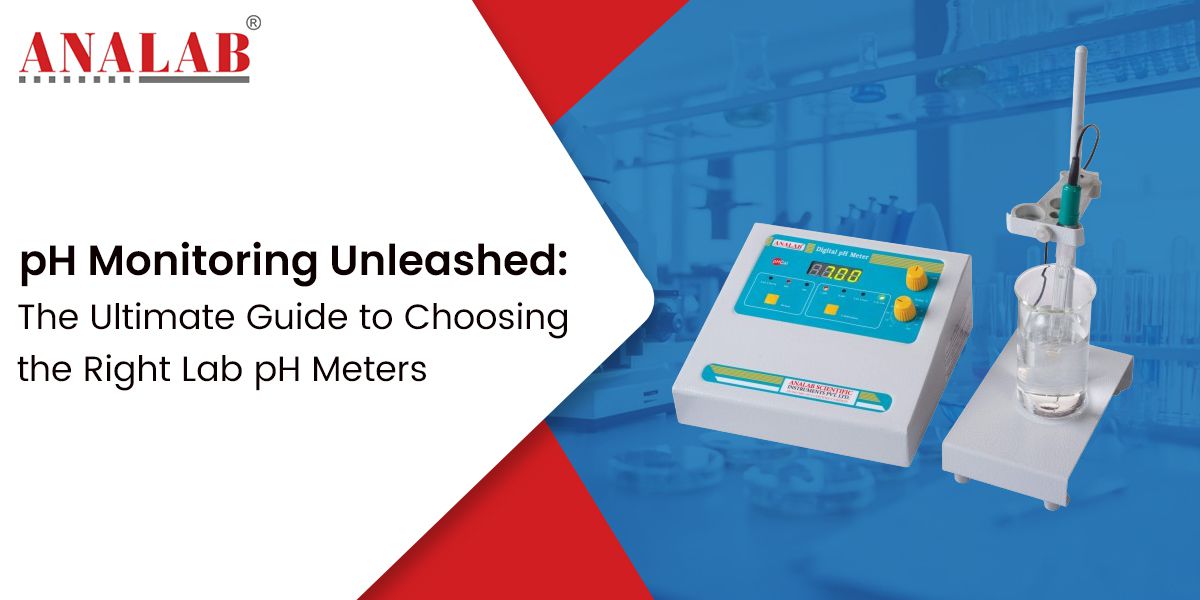
27 Dec 2023
Welcome to AnaLab Scientific Equipment, your ultimate destination for cutting-edge laboratory instruments and tools. In the realm of precision and accuracy, pH meters stand tall as indispensable devices for scientific analysis across various industries. From pharmaceuticals to environmental testing, choosing the right pH meter is crucial for reliable and consistent results. In this comprehensive guide, we'll delve into the world of pH monitoring, exploring the nuances and factors critical to selecting the perfect ph meter for laboratory.
pH is a measure of the acidity or alkalinity of a solution, indicating the concentration of hydrogen ions within it. This measurement is crucial in various laboratory applications due to its significant impact on chemical reactions, biological processes, and material characteristics. In scientific experiments, pH serves as a fundamental parameter, influencing reactions' kinetics and outcomes. It directly affects enzyme activity, protein folding, and microbial growth, making it pivotal in biological and biochemical studies.
Moreover, pH plays a pivotal role in quality control processes across industries. In manufacturing, particularly in pharmaceuticals, food production, and water treatment, maintaining specific pH levels is essential to ensure product quality and safety. pH monitoring enables precise control over formulations, guaranteeing consistency and reliability in the final products.
Understanding pH's influence on different chemical reactions is crucial. For instance, in chemical manufacturing, certain reactions require specific pH conditions for optimal yields or to prevent unwanted by-products. Additionally, in environmental science, monitoring pH levels in water bodies is essential for assessing ecological health and the presence of pollutants. Overall, pH measurement is indispensable for understanding and manipulating various scientific and industrial processes.
These are stationary units designed for laboratory use. They offer high accuracy, precision, and versatility. Benchtop pH meters are ideal for extensive testing across different sample types and are commonly used in research, pharmaceuticals, and educational institutions.
Portable pH meters are compact and designed for fieldwork or on-the-go testing. They provide convenience without compromising accuracy, making them suitable for applications where mobility is essential, such as environmental monitoring, agriculture, and on-site quality checks.
Digital Ph meter offers readings displayed digitally, ensuring ease of use and accurate results. They often come with additional features like data logging, automatic temperature compensation, and user-friendly interfaces, making them a popular choice across various industries.
Choosing the right lab pH meter involves considering several crucial features to ensure accurate and reliable measurements. Here's a comprehensive guide covering the essential factors to consider when selecting a ph meter for laboratory use:
Opt for a pH meter with high resolution to detect minor pH changes accurately. A higher resolution (0.01 pH or finer) allows for more precise measurement of variations in acidity or alkalinity.
Consider pH meters that offer convenient and reliable calibration methods. Some meters have one-point calibration, while others provide multi-point calibration for increased accuracy across a broader pH range.
Check the electrode options available for the pH meter and ensure compatibility with the substances you intend to measure. Different electrodes suit various applications, including general-purpose, high-temperature, or specialized measurements.
Temperature can significantly impact pH readings. Opt for a pH meter equipped with temperature compensation features. These features adjust pH measurements according to temperature variations, ensuring accurate results regardless of temperature changes.
Choose a pH meter with a user-friendly interface and intuitive controls. Consider features like digital displays, simple menu navigation, and clear instructions for easy operation. A straightforward setup and use streamline the measurement process, especially in busy laboratory settings.
Consider the maintenance needs of the pH meter. Opt for models that are easy to clean and maintain. Look for features such as detachable or replaceable electrodes, durable construction, and minimal maintenance requirements to ensure longevity and reliable performance.
As one of the Top Laboratory Equipment Manufacturers in India, AnaLab Scientific Equipment stands at the forefront of innovation and reliability. Our commitment to excellence ensures that our pH meters are crafted with the latest technology, providing unparalleled accuracy and durability. Here's why AnaLab should be your preferred choice:
Choosing the right ph meter for laboratory as well as ph meter for water testing is pivotal for precise and reliable measurements across industries. AnaLab Scientific Equipment prides itself on delivering cutting-edge pH meters that meet the highest standards of accuracy, durability, and performance. Whether for laboratory research, water testing, or industrial applications, trust AnaLab to provide the perfect pH monitoring solution.
For unparalleled precision and accuracy in pH measurement, explore our range of pH meters at AnaLab Scientific Equipment today!
Contact us to learn more about our products or schedule a consultation with our experts for tailored solutions to your pH monitoring needs. Experience the AnaLab difference – where excellence meets innovation in laboratory equipment.